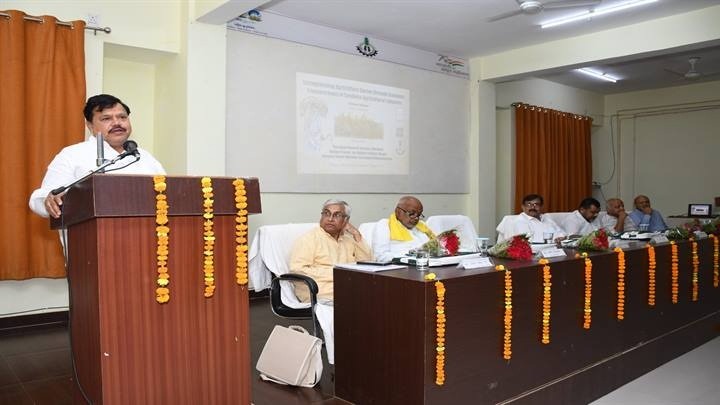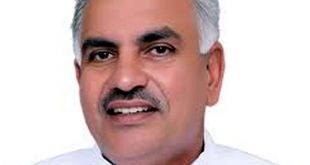
Satna, June 29 (HS). The model presented by the nation's sage Nanaji Deshmukh for landless agricultural labourers through the Chitrakoot Project is a basic source of inspiration for realising the dream of self-reliant India along with self-reliant villages. In today's time, we need to make multi-dimensional efforts for the economic empowerment of landless agricultural labourers.
Energy Minister Pradyuman Singh Tomar expressed these sentiments as the chief guest in the inaugural session of the two-day national seminar organized at Mahatma Gandhi Chitrakoot Gramodaya University on Saturday with the aim of strengthening the agricultural sector by economically empowering landless agricultural laborers. The two-day national seminar is being organized jointly by Mahatma Gandhi Chitrakoot Gramodaya University, Deendayal Research Institute and Madhya Pradesh Jan Abhiyan Parishad. In this seminar, scholars from many states across the country have gathered for discussions.
In the inaugural session, special guest and former Union Minister Sanjay Paswan urged to think 'out of the box' to find a solution to the issue of landless labourers by linking it with sensitivity, prestige, dignity and privacy. He said that anti-India forces want to see a conflict between farmers and landless labourers, but our effort should be to find a solution through coordination. Our efforts should not be merely ornamental but instrumental.
Presenting the keynote address, the convener of the seminar and national convener of Samajik Samrasata Shyama Prakash said that western thinking has tried to make our view differentiating between farmers and landless labourers, but in reality both are the same. Complementary to each other and essential for the rural economy. Throwing light on the objectives of the seminar, Shyama Prasad said that in this seminar, learned administrators and activists from various states of the country have presented the problems and challenges of landless farmers of their respective areas along with their solutions. These will be discussed comprehensively. The method of working in future will also be made.
Prof. Bharat Mishra, Vice Chancellor of Gramodaya University and Chairman of the inaugural session said that Mahatma Gandhi Chitrakoot Gramodaya University is making its special identity in the country through its innovations. Sharing memories of Nanaji Deshmukh, Dr. Mishra said that Nanaji used to say that in today's circumstances – 'villages are becoming deserted and cities are being populated.' This model of development is not right in the long run. Its results will not be in the interest of society and the nation. Prof. Mishra said that Nanaji's thinking can give a new vision to the country. He expressed satisfaction that discussions on this subject of national importance are taking place in Nanaji's university.
In the inaugural session, special guest Abhay Mahajan, the organization secretary of Deendayal Shodh Sansthan, shared Nanaji's resolution of self-reliant villages. Basant Pandit gave a factual presentation of the efforts being made by Deendayal Shodh Sansthan for the economic upliftment of landless laborers. He presented the three-tier village development model – in which he shared experiences and information in detail about production at the first level, processing at the second level and marketing chain at the last level.
Special guest Dr. Dhirendra Kumar Pandey, Executive Director of Madhya Pradesh Jan Abhiyan Parishad, described the Parishad as the largest organisational system of voluntaryism in the state and presented its form at various levels. Dr. Pandey also elaborated on the schemes and achievements of the Parishad. Deepak Khandekar, former Additional Chief Secretary of Madhya Pradesh Government and currently the Convener of Tribal Cell Raj Bhavan, said that we are all aware of the problem, we should move towards its solution. From this point of view, policy making is very important. Which measures can improve the economic condition of landless labourers should be properly considered in this seminar. Education is the most important factor that brings change in the life of the resourceless. Therefore, availability of quality education and later opportunities for skill education is very important for the families of landless labourers.
On the occasion of the inaugural session, a book of reports prepared on the basis of a study on the socio-economic condition of landless labourers of 13 states – 'Socio Economic Reports of Landless Labour from Various States' and a book 'Voice of the Landless', a compilation of thought-provoking articles on this subject, were released by the guests. The convener of the seminar, Prof. Amarjit Singh, expressed his gratitude. The programme began with garlanding the portraits of the Father of the Nation, Mahatma Gandhi, Deendayalji and Nanaji. The scholars participating in the seminar will think comprehensively about landless agricultural labourers and at the end of the seminar, a report will be presented in the name of Chitrakoot Declaration, in which, along with the expectations from the government and society, a road map for moving forward in this direction will also be given. In the seminar, on Sunday, a direct contact and dialogue of scholars with landless agricultural labourers will be organised, in which scholars from across the country will interview the agricultural labourers about their condition and direction in their own words, their challenges and pains.
 look news india
look news india
